
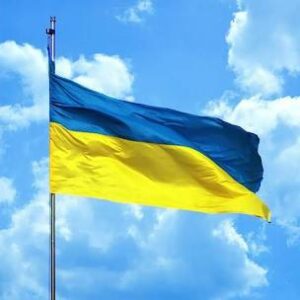
Please pray for the suffering people of Ukraine and the much-suffering Palestinian people of Gaza and the West Bank.
__________________
Why an article about King David in the middle of September? Just because…
Because I’ve wanted to write about this fascinating and significant man, but there’s never an appropriate time. Many prophets get their own days on the Orthodox calendar: Ezekiel, Jeremiah, Isaiah and so on. But poor David has to share the Sunday after the Nativity with James the Brother of the Lord and Joseph the Espoused of the Virgin Mary. Also, that’s a time when most preachers talk about the birth of Christ, so they give David only a passing nod, if that.
So… today, I now officially declare for purposes of this Post, is Saint David’s day.
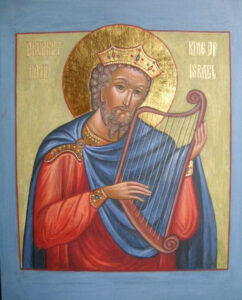
David is one of my favorite people – this shepherd boy who rose to be the greatest King of Israel, this sinner who truly repented, this deeply spiritual man, a musician and poet, and so much more.
His Titles
Holy and Righteous. We might just as easily call him Saint David. As I think you know, in most languages there is one word for “holy” and “saint”. Only English, for some reason, make a meaningless distinction between the two. The Greek word is “Agios/Άγιος” which can be translated as either “holy” or “saint”. In French, for the Thrice-holy Hymn, they sing “Saint, Saint, Saint”. Was David’s life entirely holy? Well, not quite. We’ll come to that.
Prophet. In the sense that he received messages from God (“Thus says the Lord…”), No. But in the sense of the Greek word προφήτης (prophḗtēs), one who “speaks forth”: Yes. We understand all great Old Testament figures to have predicted, paved the way for the coming of Christ.
King. That’s obvious. He was King of Israel about the year 1000 BC.
Ancestor of God! This, on the other hand, requires an “exclamation point”. He is called “Ancestor of God” in the same way the Virgin Mary was given the title “Theotokos”, “Bearer of God” (popularly “Mother of God”), to make the point that the One she gave birth to was fully divine, the Son of God, God Incarnate. So her mother Saint Anne is often listed as the Grandmother of God, and David as the Ancestor of God. I think early Orthodox Christians rather enjoyed promoting the “shock value” of these titles. “Take that! you Arian heretics who don’t believe in the divinity of Jesus”.
David’s story is found in 1 Samuel chapter 16 through 2 Samuel chapter 24. It’s repeated from a slightly different angle in 1 Chronicles chapters 11-29.
The Background

Up till the generation before David’s rule, the Hebrews had never had a king but rather were presided over by Judges, gifted men (and one woman, Deborah) who were guided by God. People came to them to have disputes judged, problems solved. The last of the judges was Samuel, and that is where today’s story begins.
The people became eager to have a king ruling over them like the surrounding nations, and to lead an army to save them from their Philistine enemies. Samuel told them it was a bad idea: Heretofore they had had one King: the Almighty God. Human kings, Samuel warned, will tax you and take the best of your animals and grain, and take your sons into his army, and maybe even your daughters for “this and that”. No, no, cried the people. We want a king.
So Samuel gave up. He prayed to God who directed him to choose Saul, whom he anointed as King. Saul was a reasonably good military leader, but in other ways he was disobedient to God. Also he developed “spells” (we’d call it a mental illness), when he behaved very strangely and wasn’t functional.
Samuel again consulted God who told him He had rejected Saul. He was to choose a new king.
Now enter David.
David’s early life
Samuel was directed to find the new king in the house of Jesse, who paraded his six older sons before him. No, none of them. Do you have any others? Yes, David our youngest who is tending the sheep, but he’s just a boy. So Jesse brought in David, who “was glowing with health and had a fresh appearance and handsome features”. 1 Samuel 16:12 To their amazement, Samuel anointed David to be the next King of Israel.
Saul unknowingly called David to be close to him and his family. In fact David and Jonathon, Saul’s oldest son, became best of friends.
David was a musician, played the harp. Here is an old spiritual, sung by the Los Angeles Children’s Choir.
When Saul was having his spells, David would play on the harp which soothed him – though before Saul settled down he sometimes threw a spear at David, who learned to duck.
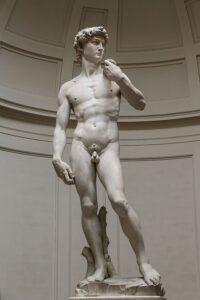
It looked like the Philistines were about the win a great battle. They sent in the giant Goliath. * Who dared challenge him? David volunteered. Goliath taunted “Am I a dog, that you come at me with sticks?” David taunted back: “Now you shall know that the Lord God of Israel is King.” You know the story: David the shepherd boy had learned how to deal with wild animals. He took large stones, put them in his slingshot, knocked Goliath out with one shot to his forehead, then leapt up and emerged with the head of the giant. The Philistines fled in fear, and David became a great popular hero.
- It says he was about ten feet tall.
His fame grew. David showed himself brave and successful in battle and became even more popular. People would chant (no doubt exaggerating): “Saul has slain his thousands, and David his tens of thousands”. This did not improve King Saul’s moods. He became insanely jealous and set out to kill David. Saul’s son Jonathon took a dangerous course and protected David. Saul married his daughter Michal to David, chiefly to keep an eye on him. David had his own chances to murder Saul, but he didn’t take them, because Saul, for all his faults, was still God’s anointed. David knew he was only “king in waiting”.
Finally God turned entirely against Saul. A great battle was to happen next day. Saul, disobeying his own commands, went to a spiritualist, “the witch of Endor”, to summon up the wraith of Samuel to find out what was going to happen. Samuel told him: Because of your disobedience, tomorrow you and all your sons will die, and your dynasty will end. The great King Saul died a ruined man. Even David’s beloved friend Jonathon was killed in the battle.
King David
Now David was King. A perfect man? No. (We’re coming to that.) But a great King. His reign is called the Golden Age of ancient Israel. He was a great warrior. Their enemies were driven back, all the Hebrew tribes were united, and the Kingdom expanded to take in land north into Syria, east well into what is now Jordan, south into the Negev.
David was a deeply spiritual man, a poet, a writer of hymns. You know that the book of Psalms is titled “The Psalms of David”. * He was sometimes enthusiastically spiritual. When he established Jerusalem as his capital, he moved the Ark of the Covenant there. On its arrival, wearing only an ephod (a priestly undergarment) David “danced and whirled” before the Ark. His wife Michal was utterly disgusted by the spectacle. Well, theirs had never been a love-match.
- No one has ever suggested that David wrote them all. Traditional translations attribute many to David, others to Asaph or the Sons of Korah. Some modern translators have been skeptical of this, though here is a paper arguing for their authenticity: https://biblicalelearning.org/wp-content/uploads/2020/10/Frazer-PsTitles.pdf
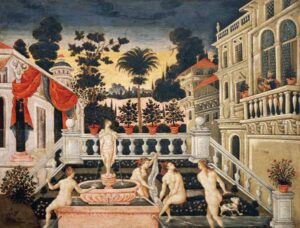
Now the famous (infamous) episode of King David’s adultery: It happened like this. David built a magnificent cedar palace in Jerusalem. One day he looked out his window and saw a gorgeous woman, Bathsheba, bathing on her nearby rooftop. * Her husband Uriah the Hittite was a soldier, away in battle at the time, so David sent for her – after all, one mustn’t disobey the king – and she soon discovered she was pregnant.
- Don’t ask why she was bathing in plain view of the palace. You already know the answer.
Now what to do? David quickly brought her husband home, in hopes that the child would be thought to be Uriah’s. But no. Military men at time of battle were forbidden to have relations with their wives, and Uriah was obedient and wouldn’t cheat. So – this is really bad – David ordered Uriah to be sent into the front line of battle and then abandoned, so he would be killed. After a suitable period of mourning, Bathsheba was brought to the palace and they were married. * They thought they had got away with it…
- Having more than one wife was still acceptable. Remember King Solomon had 700 wives and 300 concubines – exhausting even to think about.
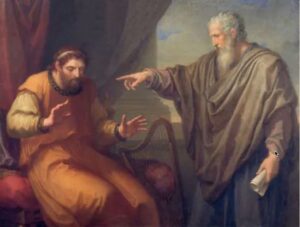
…until one day David’s court prophet Nathan came to him and told him about a man in his kingdom who had only one ewe lamb. Then a rich man with all the sheep he needed, killed the poor man and took his only lamb. What should be done with this man? David was angry: That man should die! Nathan looked him square in the face and said: “You are the man.” King David, deeply repenting, wrote Psalm 50/51: “Have mercy on me, O God… I acknowledge my transgressions, and my sin is always before me.” * (In our Orthodox worship, this Psalm is read more than any other. Put it in the mouth of David, and it comes alive.) But Nathan told David that henceforth his life and his kingdom would never again be free from threats, and their newly conceived son would die.
- Some make the point today that God works through leaders who are sinners. Well, yes, who else has he got to work with! But David was king and he repented. I that the same as electing amoral men who have said publicly that they have never asked God for forgiveness?
There are many more stories, but we’re running out of space. Let’s conclude with two:
David and Absalom
Here is an episode that shows us the heart of David like no other.
Indeed David’s kingdom would be full of strife. His son Absalom rose up in rebellion against him, even drove his father and his father’s men out of Jerusalem. As they fled, a man a short distance away kept throwing stones at the King, and his men asked if they should “take him out”. David told them “Leave him alone. Let him curse. Perhaps the Lord has told him to.” Perhaps then the Lord will “look upon my misery and restore to me his covenant blessing.”
In the strife David’s rebellious son Absalom was killed – got entangled in a tree, which made him an easy target. What was David’s reaction? Was it: Thank God. Good riddance! No. Rather King David was overcome with grief. He wept and cried out “O my son Absalom, my son, my son Absolom! If only I had died instead of you, O Absalom, my son, my son…” It makes a person want to cry along with him.
The Prophecy of Nathan
All ancient kings kept prophets in their courts, many preferring false prophets who would “butter them up” and tell them what they wanted to hear *: “Good job, your majesty. You’re right about everything. Just keep it up.”
- like many other leaders and rulers throughout history and yet today
David, however, was a great king. As we have seen he wanted prophets like Nathan, true prophets who weren’t afraid to tell him what he needed to hear.
David had wanted to build a temple in Jerusalem, a proper place to house the Ark of the Covenant, but as he got older he told Nathan he could see he was running out of time.

“That night the word of the Lord came to Nathan, saying, ‘Go and tell My servant David, “Thus says the Lord: ‘Would you build a house for Me to dwell in? For I have not dwelt in a house since the time that I brought the children of Israel up from Egypt, even to this day, but have moved about in a tent and in a tabernacle… Now therefore, thus shall you say to My servant David, ‘…“the Lord tells you that He will make you a house. When your days are fulfilled and you rest with your fathers, I will set up your seed after you, who will come from your body, and I will establish his kingdom. He shall build a house for My name, and I will establish the throne of his kingdom forever. I will be his Father, and he shall be My son… And your house and your kingdom shall be established forever...”’” 2 Samuel 7:4-16
But the kingdom of David’s son Solomon was not established forever, nor were those of all succeeding kings. Finally it came clear what God had prophesied through Nathan. There would come One sent by God whose kingdom truly would be established forever. This promise we hear again and again through the remainder of the Old Testament. Until finally, out of the house of David came the One who fulfilled that promise, the One born in David’s City Bethlehem. And today we recite Nathan’s prophecy every time we say the Creed: “He will come again in glory to judge the living and the dead, and his kingdom will have no end.”
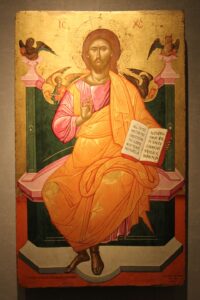
The Death of King David
“Now the days of David drew near that he should die, and he charged Solomon his son, saying: ‘I go the way of all the earth’”, and he gave instructions to Solomon.
“So David rested with his fathers, and was buried in the City of David. The period that David reigned over Israel was forty years; seven years he reigned in Hebron, and in Jerusalem he reigned thirty-three years. Then Solomon sat on the throne of his father David.” 1 Kings 2
The Tomb of King David


Next Week: 1) Why we cannot call God “she”. 2) The Orthodox approach to the environment.
Week after Next: I don’t know yet. Suggestions, anyone?
Actually, you could do an article on King David on March 1, the Feast Day of St. David of Wales. Just saying….
Aw, that would be cheating… However, Saint David of Wales is my son David’s patron. I really should do a Post on him.
« Week after Next: I don’t know yet. Suggestions, anyone? »
Yes:
Treasonous bishops and priests misusing and abusing their position by becoming mouthpieces for governments and big pharma, endorsing gross and vast infringements on civil liberties and human rights and an enormous shift of wealth from bottom to top, and shaming those who are intelligent enough not to undergo an unnecessary experimental injection with no sound proof of significant efficacy whatsoever as deficient in love by stating or implying that accepting said experimental injections is an act of love or that said injections have somehow the stamp of divine approval.
No. We all know the ways of men, lusting after power, money and things of this world. Simply keep speaking and writing out of The Book and we will put what is needed together, with God’s grace.
Dear Manfred:
You’re welcome to write as many comments on this topic as you wish. Perhaps you’ll get some responses. However, as I told you some letters back, I’m not going to respond any more.
Father Bill
Dear Father Bill,
Of course you have the choice to not respond.
But then: don’t ever pretend that you are led by science or follow science.
Science, in its modern empirical shape, but also in earlier varieties, entails: being open to counter-arguments, weighing new evidence, being open to falsification.
Science does NOT mean: making a claim (Covid vaccines reduce transmission), then presenting evidence for that claim that, when one actually goes two, three clicks further and reads the studies, turns out to be deeply, deeply flawed and manipulative, and, when challenged with that, refusing to discuss that.
Many, many people lost their reputation, lost friends, lost good relations with family members and relatives, lost their jobs, some lost: their health, lost their lives because of policies that deeply, deeply violated human rights, and because of incessant and malicious propaganda.
And you, without any need to do so, repeatedly joined in with the propaganda.
But why you did so can be easily explained:
Science:
« People who feel public support, in contrast, tend to express their opinion loud and clear. »
https://noelle-neumann.de/scientific-work/spiral-of-silence/
A minor but important premise overlooked in the above initial response, “…don’t ever pretend that you are led by science or follow science”. His title is ‘Priest’ meaning he is not “lead by science” anymore than a baseball player in such matters.
I did enjoy your clear expressions in understanding science and all that comes & follows from such. Another method of putting it is that science stands simply to be corrected on a never ending go-around. A self-correcting discipline is most admirable! As an existential phenomena science can be ‘correct’ today and within a short while wrong/bad making ‘even better science’. You correctly point out that the only ‘sin’ in science is to refuse to dialogue with alternative approaches or POVs. From that tragedy could have been avoided however tragedy by definition has an element of unknown or inexplicable reasons. A meteor landing on a car is a tragedy. What occurred during that pandemic has not been cleared up enough but does seem to have people with differing agendas, some of which ignored our Constitution as well as basic human rights. Maybe ‘the science’ led to their conclusions and I will never know due the ratio of signal to noise. Lord, have mercy.
Len,
You write:
« You correctly point out that the only ‘sin’ in science is to refuse to dialogue with alternative approaches or POVs. »
No, I did not point out any such thing.
If you quote: quote correctly.
If you paraphrase: paraphrase correctly.
I did not use the term « sin ».
But if one wants to speak of sin in that context:
Refusing dialogue/alternative approaches is certainly not the only sin in science, and I did not state or imply that it is.
« From that tragedy could have been avoided however tragedy by definition has an element of unknown or inexplicable reasons. A meteor landing on a car is a tragedy. »
That is not the definition of tragedy that I learned in school; particular a meteor landing on a car: none of my teachers would have called that a tragedy.
Which are your five favourite tragedies that you have read/watched on stage/watched as a movie?
You write:
« What occurred during that pandemic has not been cleared up enough but does seem to have people with differing agendas, some of which ignored our Constitution as well as basic human rights. »
I beg to differ:
What occurred has been to a considerable extent cleared up — but that has either been directly censored or at least suppressed, or it has been preemptively ridiculed and defamed so that people won’t bother to look into it. But that doesn’t mean that the investigations and analyses are not there.